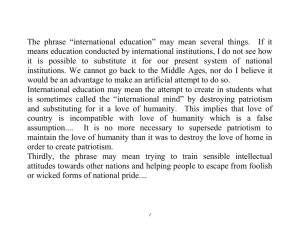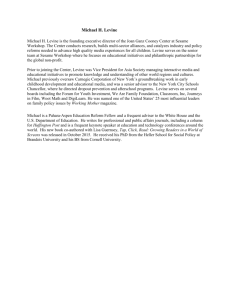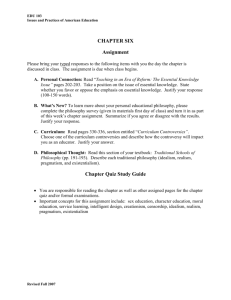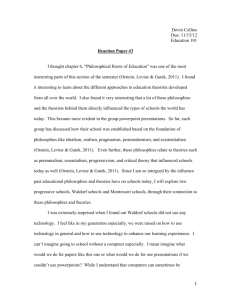Reaction Paper #3 - Foundations of Education
advertisement
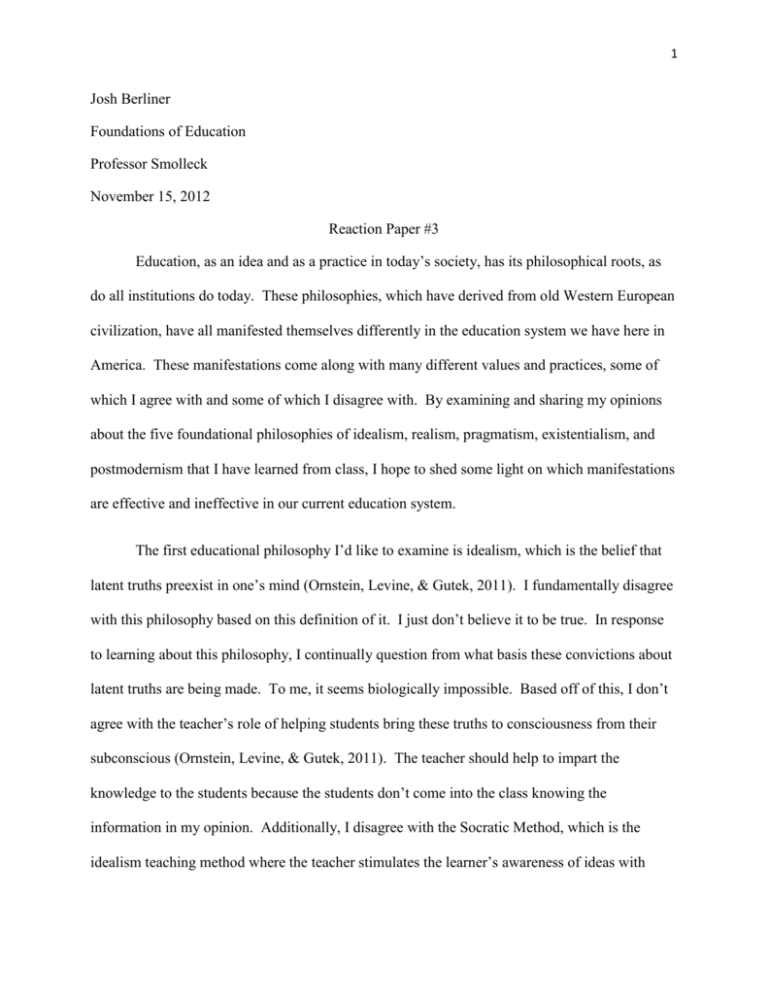
1 Josh Berliner Foundations of Education Professor Smolleck November 15, 2012 Reaction Paper #3 Education, as an idea and as a practice in today’s society, has its philosophical roots, as do all institutions do today. These philosophies, which have derived from old Western European civilization, have all manifested themselves differently in the education system we have here in America. These manifestations come along with many different values and practices, some of which I agree with and some of which I disagree with. By examining and sharing my opinions about the five foundational philosophies of idealism, realism, pragmatism, existentialism, and postmodernism that I have learned from class, I hope to shed some light on which manifestations are effective and ineffective in our current education system. The first educational philosophy I’d like to examine is idealism, which is the belief that latent truths preexist in one’s mind (Ornstein, Levine, & Gutek, 2011). I fundamentally disagree with this philosophy based on this definition of it. I just don’t believe it to be true. In response to learning about this philosophy, I continually question from what basis these convictions about latent truths are being made. To me, it seems biologically impossible. Based off of this, I don’t agree with the teacher’s role of helping students bring these truths to consciousness from their subconscious (Ornstein, Levine, & Gutek, 2011). The teacher should help to impart the knowledge to the students because the students don’t come into the class knowing the information in my opinion. Additionally, I disagree with the Socratic Method, which is the idealism teaching method where the teacher stimulates the learner’s awareness of ideas with 2 questions, which then enables the learner to realize these ideas latent in their minds (Ornstein, Levine, & Gutek, 2011). I believe that this method is too uncommon for most students, which would make them uncomfortable with it and unresponsive to it. In my freshman high school English class, my teacher tried using the Socratic Method. He only tried it that one time due to the fact that we students were not used to it and were, for the most part, unresponsive to it. As a result, the learning process during the Socratic Method lesson was ineffective. The only two aspects of idealism I agree with are that education should be open to all students and that the main focus should be on intellectual development. The next educational philosophy I’d like to delve into is Realism, which is the belief that reality is objective, or outside of our minds, and not internal (Ornstein, Levine, & Gutek, 2011). I fundamentally agree with this philosophy based on this definition. I believe that we humans have the ability to know the world surrounding us through the scientific method. As a result, we formulate accurate theories of the world around us to base our rational decisions and behaviors off of (Ornstein, Levine, & Gutek, 2011). Based on this, I believe that students should gain the knowledge they need from their teachers, who should be experts at the knowledge they teach and who should be external and objective sources of knowledge for the students. From personal experience here at Bucknell, I can say that this system of experts imparting knowledge onto students is very successful and it is something that I have been very excited about during my time on campus. It exists across the country. I have also experienced when a teacher, particularly while I was in high school, is not an expert and does not teach the knowledge to the students. This usually resulted in confusion throughout the class and dislike for the teacher. The only aspect of realism that I disagree with is that the teacher should focus less on the therapeutic values of education and the teaching methods the teachers implement (Ornstein, Levine, & 3 Gutek, 2011). Even though the content is very important, these two aspects are quite important as well. Education can serve as a safe haven for students from their home lives and definitely serve in a child’s psychological and social well-being. Also, teaching methods are just as important as the content itself. From past experience, I have seen the positive effects of both of these aspects of education, especially when I was in middle school. The fact that realism puts a lesser emphasis on these two aspects of education concerns me. The next philosophy on education I’d like to share my opinions on is Pragmatism, which is the theory that stresses the continual testing of the validity of our “tentative” ideas and knowledge through the scientific method (Ornstein, Levine, & Gutek, 2011). Based on this definition of pragmatism, I mostly agree with this philosophy. This philosophy actually excites me and others because it allows for individuals to experiment and grapple with knowledge and ideas through interactive means. Through these “experiences”, I feel that the most effective type of learning occurs. I experienced this first hand during my geology class freshman year here at Bucknell. Each week, we traveled to different geologically significant sites across central PA and learned first-hand about the material covered in class. Additionally, I agree that school is a microcosm of society, that it is interdisciplinary, and that it is open to all (Ornstein, Levine, & Gutek, 2011). Although I mostly agree with pragmatism, one issue that I disagree with is that all knowledge is tentative. I believe that some knowledge, due to extensive research, observations, tests, and agreement, is not tentative and that it does not necessarily need to be continually grappled with. Additionally, I don’t agree that the focus should be more on problem solving than the content itself (Ornstein, Levine, & Gutek, 2011). Both of these aspects of learning are equally important in my view. Especially in middle school, I have experienced first-hand the 4 confusion and ineffectiveness of solving problems collaboratively without a solid foundation in the content needed to solve the problem. Another educational philosophy I’d like to shed some light on is Existentialism, which examines the way in which humans define themselves by making personal decisions and choices in their daily lives (Ornstein, Levine, & Gutek, 2011). Additionally, this philosophy incorporates the idea of angst, which expresses that we will eventually die and that the decisions we make throughout our lifetime will not make any real difference in the world we live in today (Ornstein, Levine, & Gutek, 2011). Based on these aspects, I partially agree with this philosophy. I agree that we will eventually die. This is obviously the case. But I don’t believe that we should use this as a reason to dismiss and negate the choices we make and the effect our decisions have on the world around us. We certainly can make a difference in this world through the choices we make. I have personally learned about, through my economics courses (our role as consumers) and through my environmental studies courses (our role in global climate change) that our decisions certainly do have a profound effect on the world we live in. One other aspect of existentialism that I agree with is that education should influence and promote personal examination with deep reflection (Ornstein, Levine, & Gutek, 2011). School is a time when students think critically, so why not think critically about one’s self as well? In relation to this, I also believe that class should have a discussion element of sharing one’s feelings, questions, and personal experiences that existentialism calls for (Ornstein, Levine, & Gutek, 2011). In my opinion and from past experience, this adds an interesting supplemental element to the classroom that all the students can relate to and learn from. The last philosophy on education that I would like to discuss is Postmodernism, which asserts that education and the scientific method reflect elitist perceptions of reality so that these 5 elitists can have power over others. Based on this definition, I mostly disagree with this philosophy. I just don’t see how this is true. In class, as I’ve experienced myself, all students learn material that has been tested and approved by many who are experts in the academic field. Many common subjects and topics have existed for generations and are taught an accepted by all across the world. Additionally, I don’t believe that textbooks and famous works are just biased constructions with political power relationships (Ornstein, Levine, & Gutek, 2011). I firmly believe that all texts can be great sources of information, learning lessons, and of knowledge. I find the notion that texts are seen as a means to political control completely preposterous. In my opinion, that is completely unfair to those who devote their lives to writing, constructing, and doing the research for these texts. One aspect of postmodernism that I do agree with is that education should raise awareness in students about inequalities that exist in society today (Ornstein, Levine, & Gutek, 2011). I believe this because I have seen, from personal experience, how one’s family, community, or home life can distort a student’s perception of inequality that exists in society. I believe that it is the job of the school to set these inequalities straight in the minds of students. Many different people today share different views and philosophies about what they feel is the best way to conduct education. For the most part, the views and philosophies we hold today are derived from the five philosophies I have discussed. These five philosophies, in my opinion, are all effective and ineffective in their own ways. In my view, I feel that a blend or combination of certain aspects of each of the five philosophies is necessary for our education system to be truly effective. By sharing my views on each philosophy, I hope that I have shed some light on what this blend or combination should be to ensure the success of future students. 6 Sources Ornstein, A. C., Levine, D. U., & Gutek, G. L. (2011). Foundations of education. (11th edition). Belmont, CA: Wadsworth.
